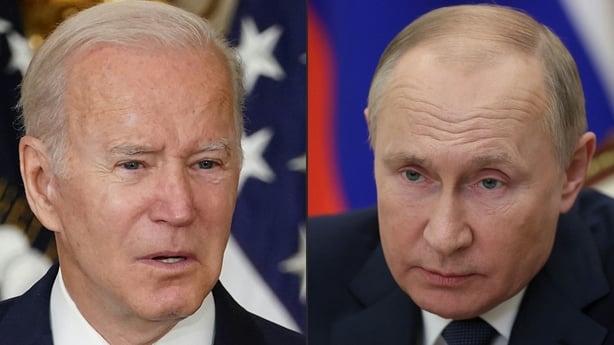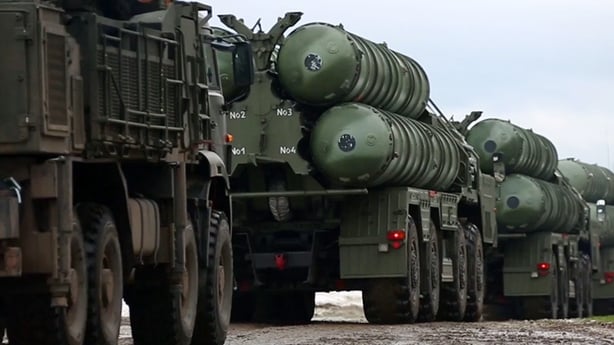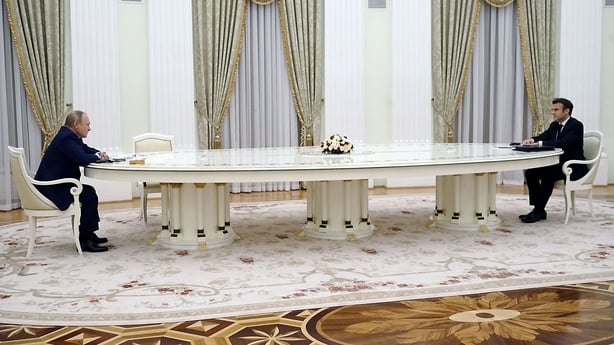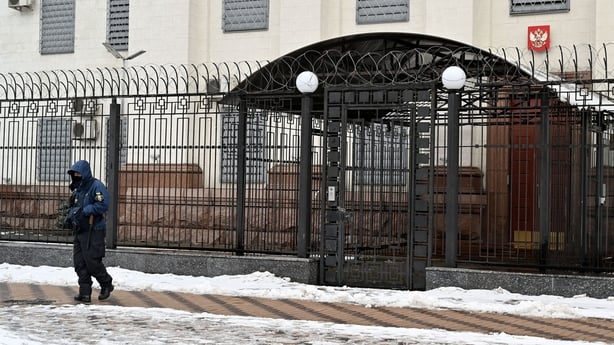US President Joe Biden told Russia's Vladimir Putin during an hour-long call that a Russian invasion of Ukraine would bring a decisive and swift response from the West, as well as producing widespread suffering and diminish Russia's standing in the world.
In the latest effort to avert hostilities, the two men spoke by phone a day after Washington and its allies warned that Russian forces massed near Ukraine could invade at any moment.
A senior Biden administration official said the call was professional and substantive, but said there was no fundamental change.
Russia's military build-up near Ukraine and a surge of military activity has fueled fears that Russia could invade. Russia denies having any such plans.
Mr Biden told Mr Putin that the United States is prepared for diplomacy and "other scenarios," the White House said.

The senior Biden administration official said the pair had a direct conversation touching on all the issues the United States has raised in public. The official said it remains unclear whether Mr Putin is willing to pursue a diplomatic path.
Earlier, the US State Department ordered most of its embassy staff to leave, adding to its call on Friday for private citizens to get out of the country within 48 hours. The Pentagon said it was withdrawing about 150 military trainers.
More countries told their citizens in Ukraine to leave the country immediately, with Ireland, Israel, Portugal and Bulgaria joining the list.
The UK also urged their citizens to leave the country, saying "leave now while commercial means are still available".
British Junior Defence Minister James Heappey also said that citizens should not expect any military evacuation as happened in Afghanistan last summer.
Read more: Govt urges Irish citizens to leave Ukraine 'immediately'
In a separate call, French President Emmanuel Macron told Mr Putin that sincere negotiations were incompatible with an escalation in tensions over Ukraine.
Mr Biden and Mr Macron are due to speak last night, according to a French presidency official. The official said there were no indications from what Mr Putin told Mr Macron that Russia is preparing an offensive against Ukraine.
Washington said on Friday that a Russian invasion of Ukraine, possibly beginning with an air assault, could occur at any time.
Moscow has repeatedly disputed Washington's version of events, saying it has massed more than 100,000 troops near the Ukrainian border to maintain its own security against aggression by NATO allies.
Meanwhile Russia, which has accused Western nations of spreading lies to distract from their own acts, said that it had decided to "optimise" its diplomatic staff numbers in Ukraine, fearing "provocations" by Kyiv or others.
It said its embassy and consulates in Ukraine continued to perform their key functions.

US Secretary of State Antony Blinken said Washington would impose swift economic sanctions if Mr Putin decides to invade.
"I continue to hope that he will not choose the path of renewed aggression and he'll chose the path of diplomacy and dialogue," Mr Blinken told reporters after a meeting with Pacific leaders in Fiji. "But if he doesn't, we're prepared."
In a phone call later with Mr Blinken, Russia's top diplomat Sergei Lavrov accused the United States and its allies of waging a "propaganda campaign" about Russian aggression towards Ukraine, the Russian Foreign Ministry said.

Separately, the Russian military said it had used "appropriate means" to make a US submarine depart from Russian waters in the far east after the vessel ignored a Russian request to leave, Interfax news agency reported.
The submarine was detected near the Pacific Kuril islands in Russia's waters as Russia conducted naval exercises, the military was quoted as saying.
However, the US disputed this saying it did not carry out operations in Russian territorial waters.
"There is no truth to the Russian claims of our operations in their territorial waters," US military spokesman Captain Kyle Raines said in a statement.
"I will not comment on the precise location of our submarines but we do fly, sail, and operate safely in international waters," the statement added.
Russia troops surrounding Ukraine on three sides
Russian naval forces and troops, including units brought in from all over the vast country, now surround Ukraine to the south, east and north.
Russia, which denies any plan to attack Ukraine, already controls the Crimea territory seized in 2014 and supports separatist forces controlling Ukraine's Donbas region in the east.
Mr Putin, jostling for influence in post-Cold War Europe, is seeking security guarantees from Mr Biden to block Kyiv's entry into NATO and missile deployments near Russia's borders.
The US and its European allies reject the demands, insisting that NATO poses no threat to Russia.
Washington regards many of the proposals as non-starters but has pushed the Kremlin to discuss them jointly with Washington and its European allies.
Still, Mr Biden has long believed that one-on-one engagement with Mr Putin may be the best chance at a resolution. Two calls in December between Mr Biden and Mr Putin produced no breakthroughs but set the stage for diplomacy between their aides.
The two leaders have not spoken since, and diplomats from both sides have struggled to find common ground.

Adding to tension, large-scale Russian military drills were under way yesterday with authoritarian ally Belarus, which lies just north of Kyiv and also borders the European Union.
According to the head of Norway's military intelligence service, Russia is operationally ready to conduct a wide range of military operations in Ukraine and the Kremlin just needs to make the call.
Four-way talks in Berlin between Russia, Ukraine, Germany and France on Thursday made no progress.
Several thousand Ukrainians rallied in Kyiv today to show unity amid fears of an invasion, as Ukraine's leader told people not to panic and pushed back against what he said was a glut of bleak war predictions being reported in the media.
Still, Washington planned to send extra troops to Poland, Ukraine's western neighbour, in the coming days to try to help reassure NATO allies, four US officials told Reuters. They are in addition to 8,500 already on alert for deployment to Europe if needed.

